

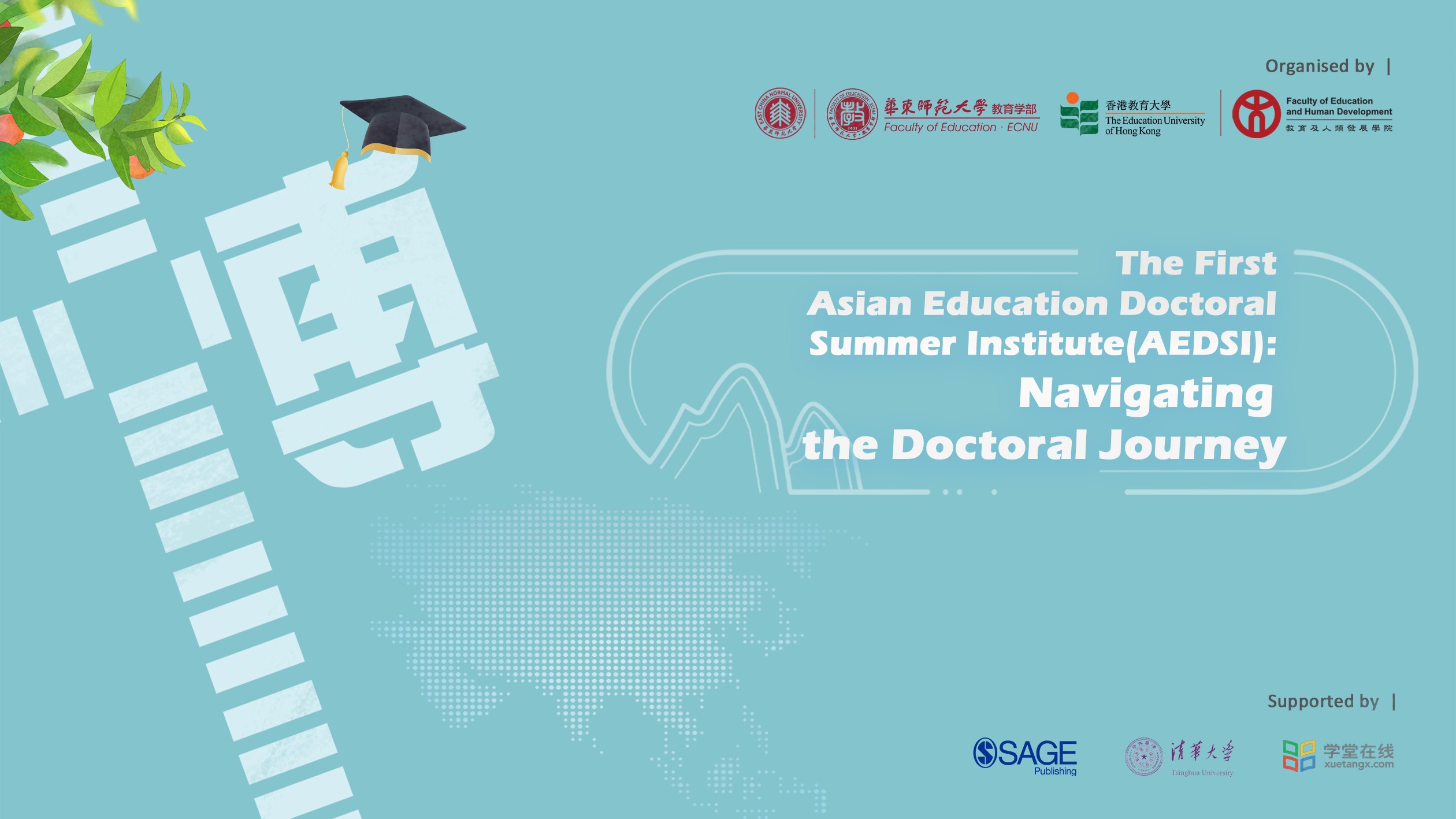
The event Navigating the Doctoral Journey, the First Asian Education Doctoral Summer Institute (AEDSI) jointly launched by the Faculty of Education of East China Normal University (ECNU) and the Faculty of Education and Human Development of the Hong Kong Education University (EdUHK), was successfully held from August 24th to 26th (Beijing Time). This online event was supported by the SAGE Publishing and XuetangX.com at Tsinghua University.
The event comprised a three-day training camp, two keynote speeches, two workshops, and six master classes, which brought together nearly 20 internationally renowned education experts, education professionals, and leaders from elite educational institutions.
Aiming to “enable Chinese doctoral students in education go out of China, stand tall in Asia, and engage globally, and enable overseas outstanding doctoral students understand Asia and approach China”, the event appealed to 66 students from ECNU and EdUHK, as well as more than 360 students from domestic universities, international partners, member universities of the Global Education Deans Forum (GEDF) and the “Campus Asia” member institutions named by the Ministry of Education in China.
Although the summer camp contains “Asia” in its name, the event also attracted many students from universities in Europe, North America and Oceania across time zones, which lays the groundwork for AEDSI to continue its journey over the world.
In addition to the students from ECNU and EdUHK, domestic doctoral participants came from Peking University, Tsinghua University, Beijing Normal University, Shanghai Jiaotong University, Nanjing University, Northeast Normal University, Nanjing Normal University, Zhejiang Normal University and many other universities as well.
Nearly half of the doctoral participants enrolled in universities outside of mainland China came from Oxford University, Cambridge University, University College London, University of California at Berkeley, Johns Hopkins University, Boston College, Seoul National University, University of Tokyo, University of Toronto, University of Sydney, University of Melbourne, University of Auckland, Nanyang Technological University, University of Hong Kong, Chinese University of Hong Kong, and so forth.
This summer camp has established a brand-new international communication platform for doctoral students in education globally.
“ABCDE” for AEDSI
Professor Chen Shuangye, the Associate Dean at ECNU Faculty of Education and Executive Deputy Editor-in-Chief atECNU Review of Education, and Professor Lim Cher Ping, the Associate Dean of the EdUHK’s Faculty of Education and Human Development and Editor-in-Chief of The Internet and Higher Education, served as mentors behind the scenes. They used five letters of “ABCDE” in the welcome speech to jointly unveil and elaborate the origin and meaning of AEDSI as follows:
“A” for Asia
“D” for Doctoral
“E” for Engage and Enjoy
“B/C” for Be Brave to Challenge, But Nicely. Be Bridge to Contribute to the Community.
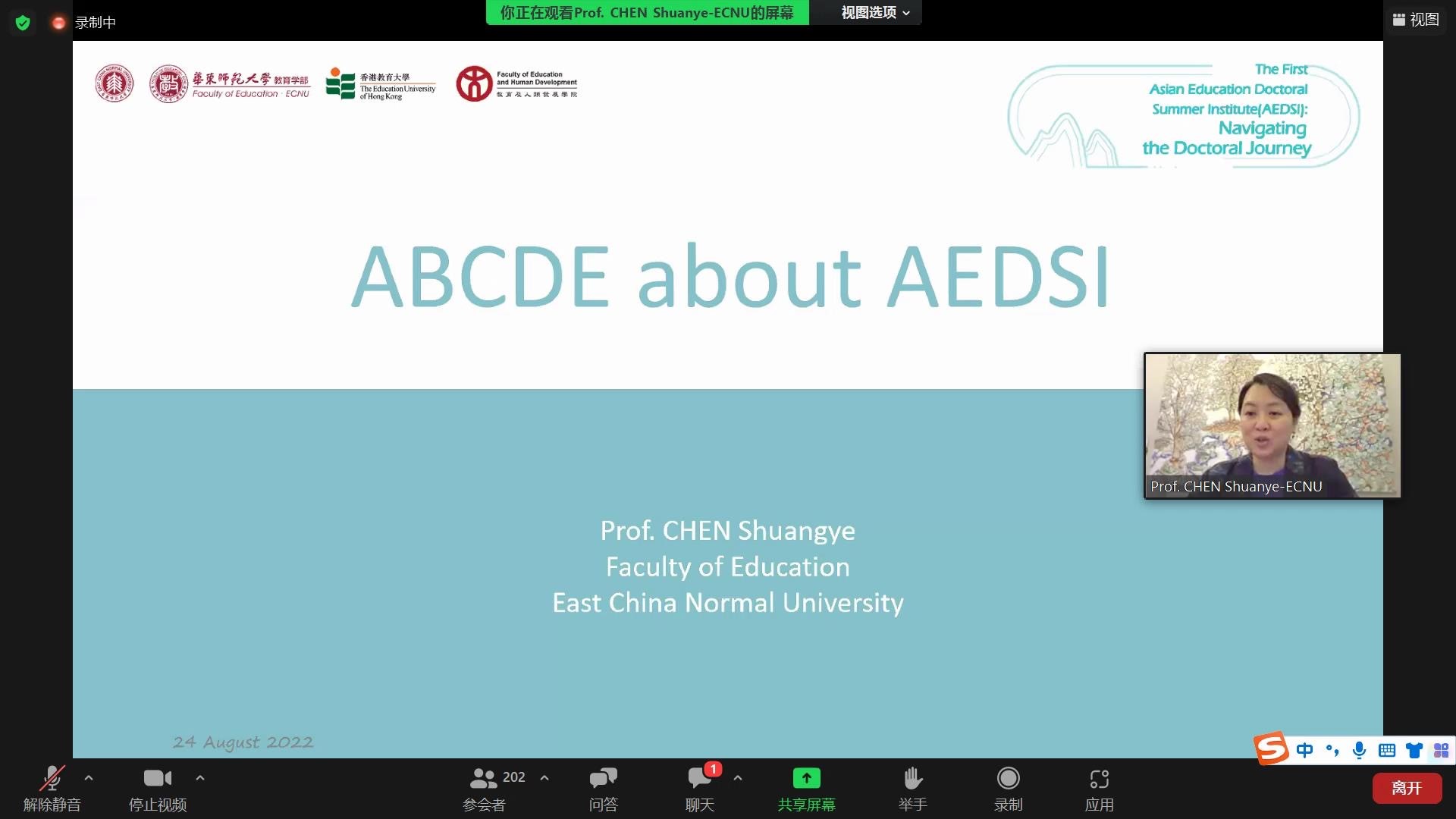
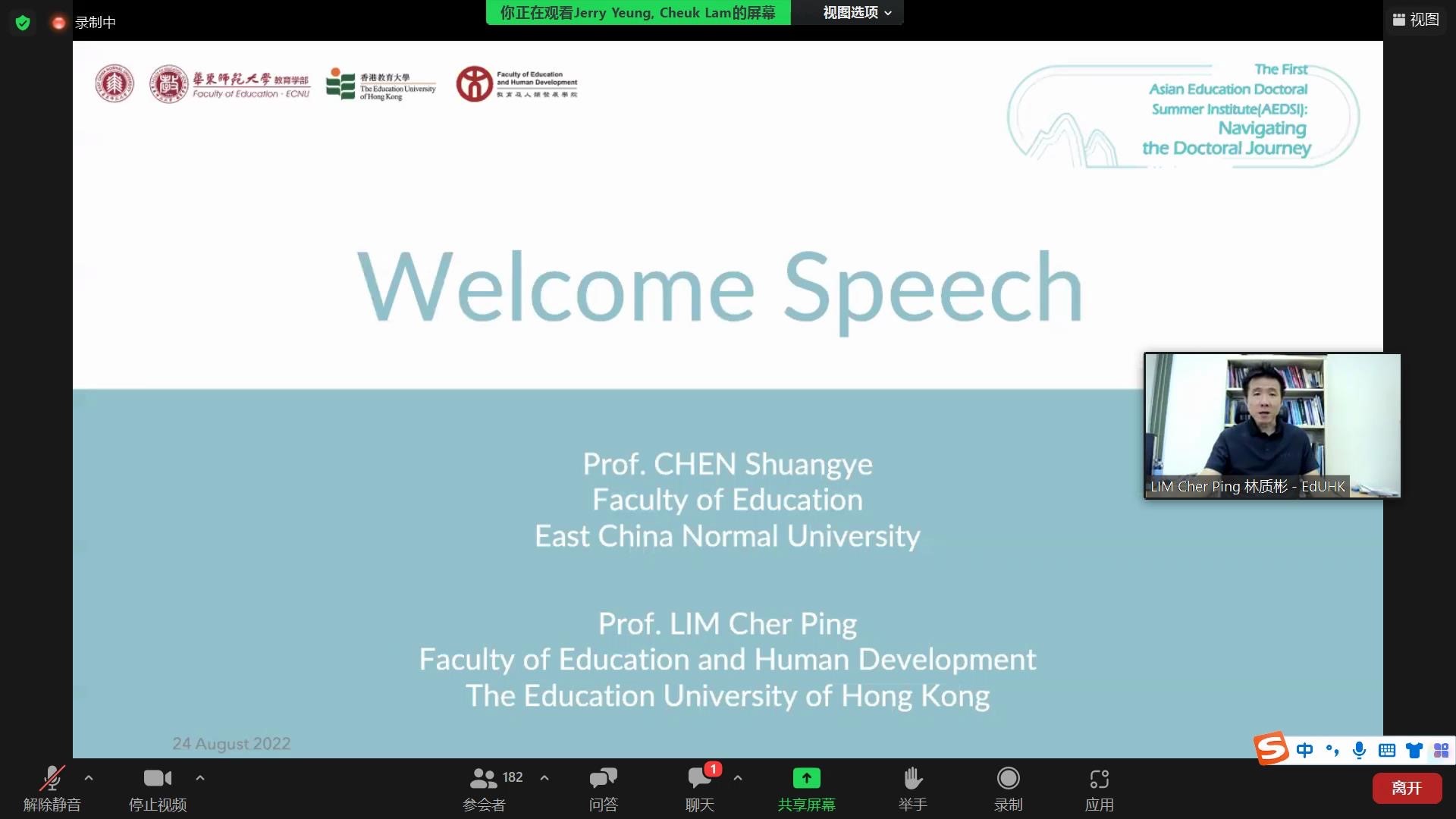
The two professors called on the doctoral students in the summer camp to pay attention to the significant potential in collaboration on educational work in Asia, to respect the different educational traditions of different countries and regions, and to promote the contribution of Asian education to the development of the world.
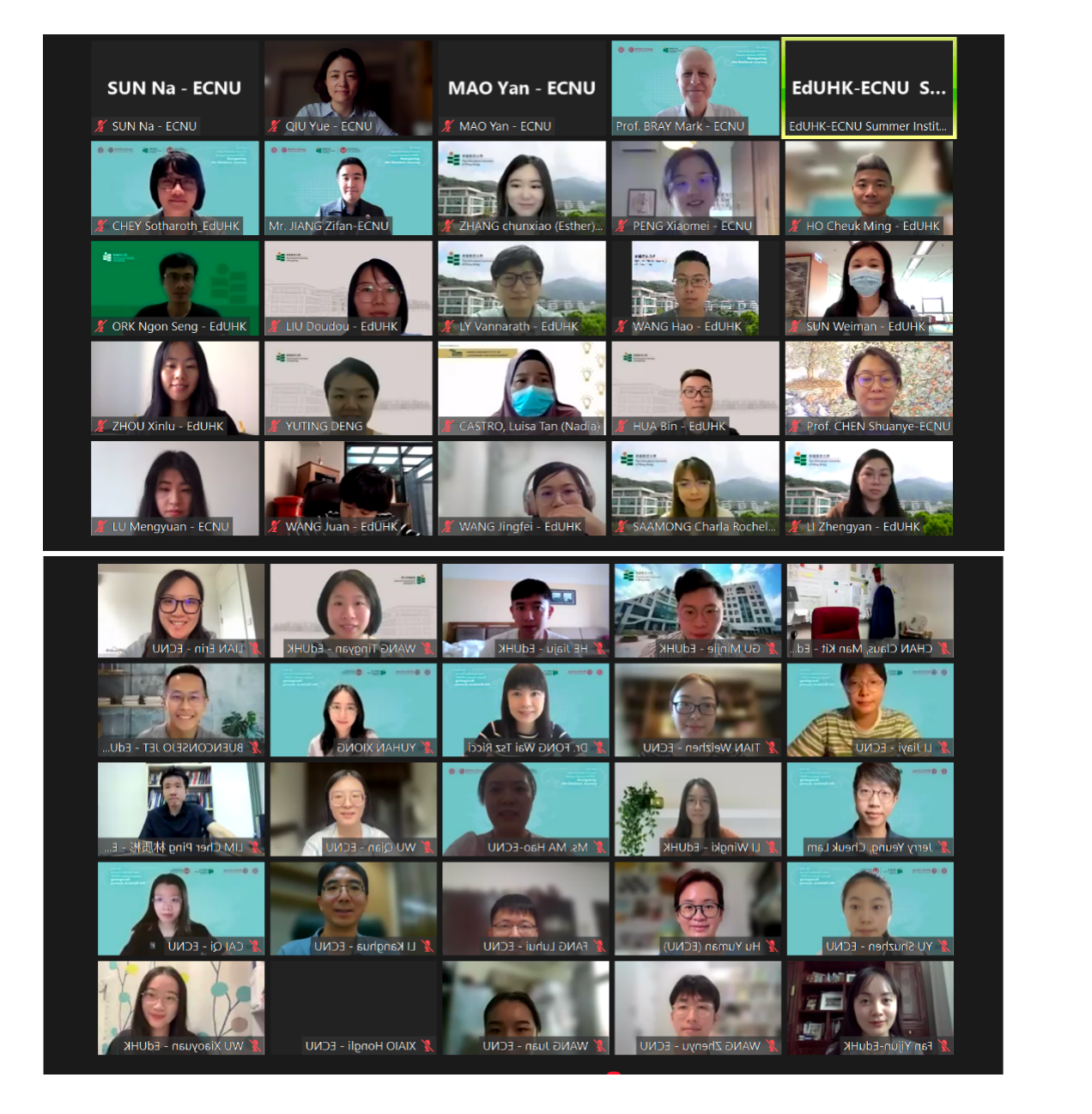
【The Aspiration of “Doctoral Journey ”】
On summer camp Day 1, Dr. Fong Wai Tze Ricci, Associate Professor of the Department of Curriculum and Teaching from EdUHK, gave a talk on “the Doctoral and Post-Doctoral Journey.”
Dr. Fong vividly compared the doctoral (and post doctoral) career to a creative baking process. The research process is like fermenting dough without the professional blending of yeast and sugar. The problems and setbacks in the research process are like the repeated kneading of the dough making process. The repeated kneading and blending (“rou nie and pai da” in Chinese) will make us more resilient, and more courageous on the journey of academic innovation.
In terms of many choices in the study and job hunting stage, she put forward four suggestions:
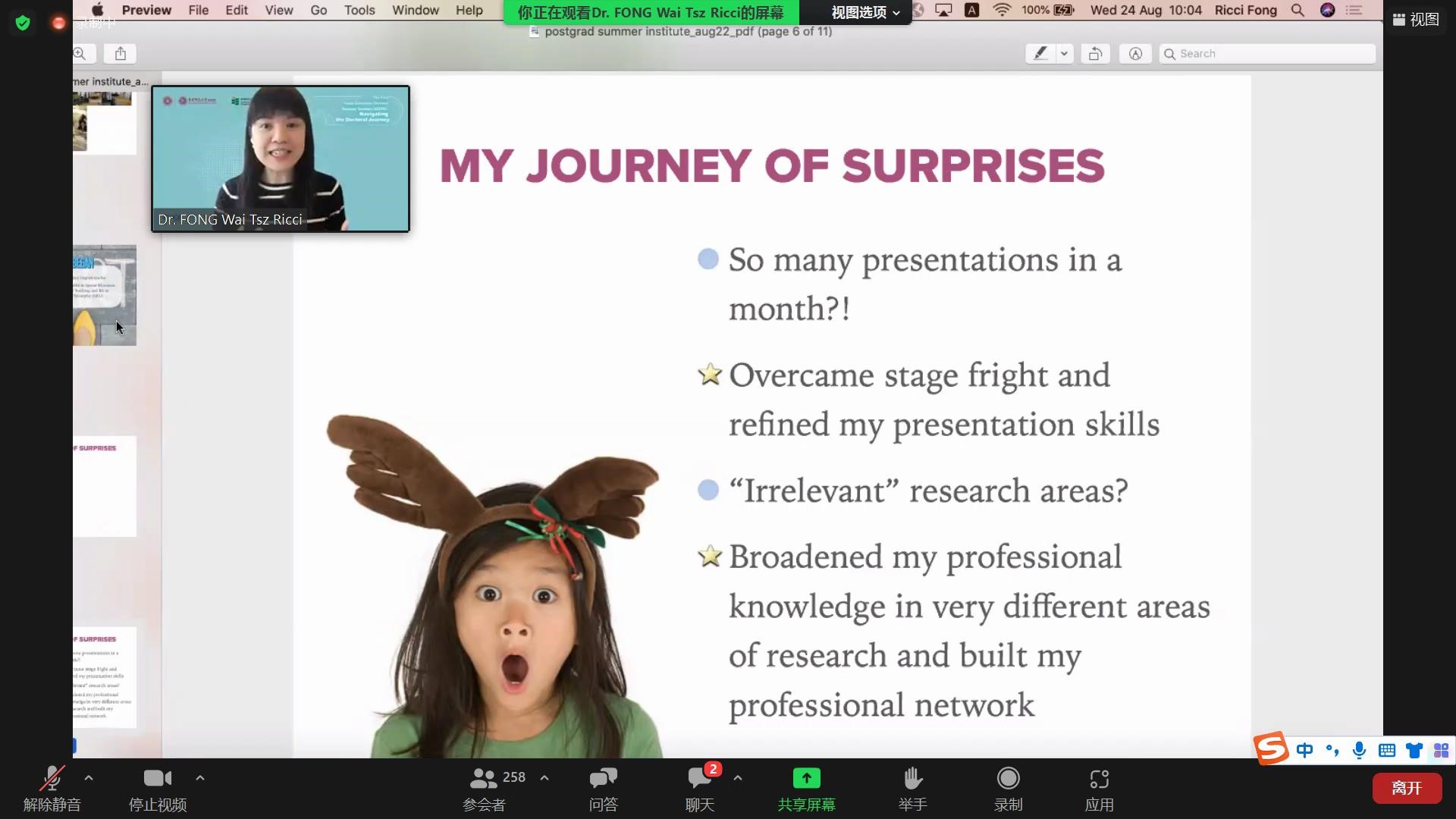
The second keynote speech was made by Professor Mark Bray, director of the International Centre for International Research in Supplementary Tutoring (CIRIST) at ECNU, on the theme of “Future Education and Future Education Researcher”. Professor Bray introduced his work and observations in Asia, and guided the participants to pay attention to “the continuity” of educational development.
Professor Bray highly valued the direction of this summer camp to focus on Asian doctoral students, and called on young scholars to pay attention to the diversity of Asian education; doctoral students, as future researchers, should actively explore and build academic paths based on local and Asian regions, see self as a part of the world, examine research issues from the perspective of “we” and “us”.
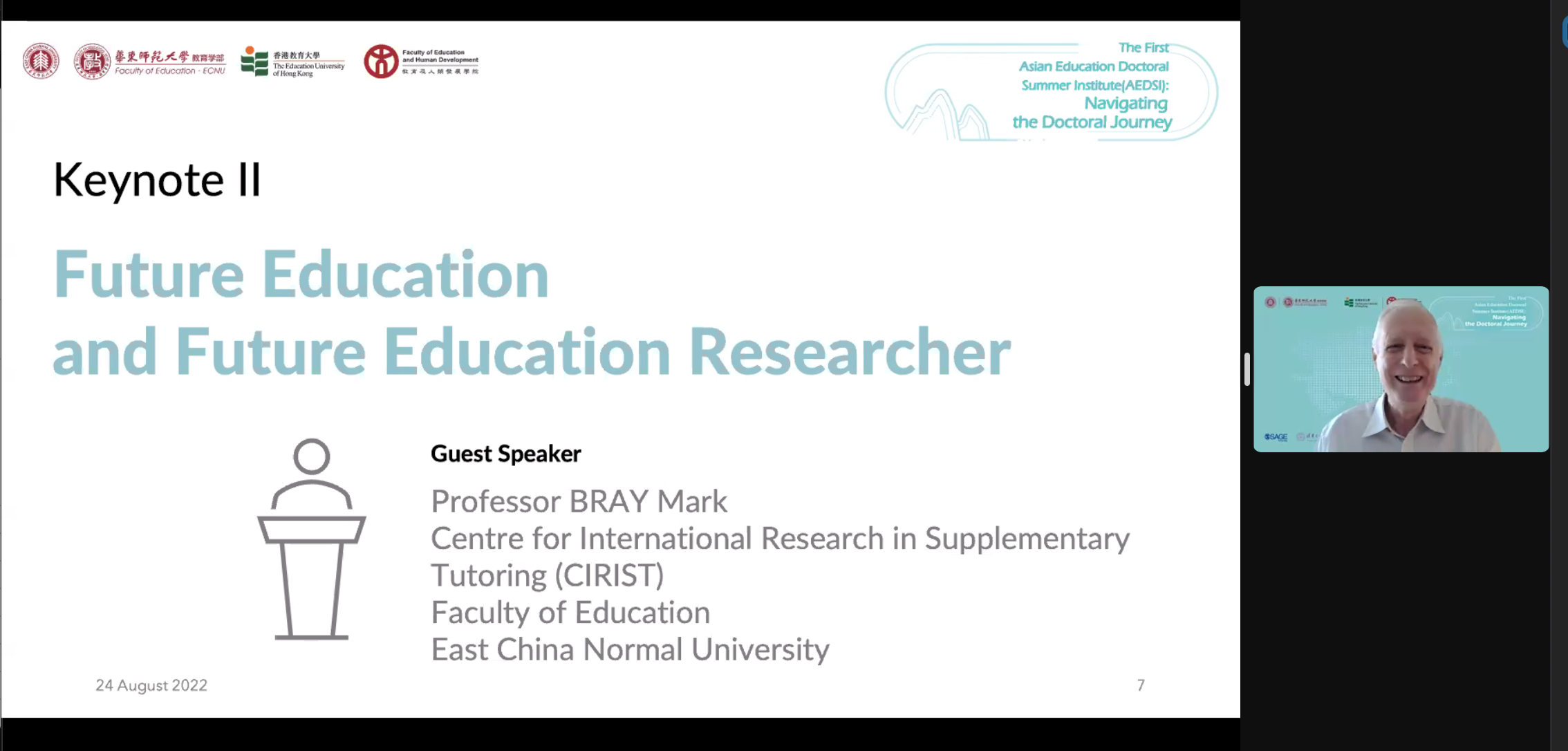
【The Paths of “Doctoral Journey ”】
Graduation job hunting has always been the top priority of doctoral students. The AEDSI’s organizing team has collected rich resources on multiple tracks of employment possibilities. The design of summer camp Day 2 embraced three different “employer perspectives” for doctoral students to learn how to cater their needs and to develop skills for international organizations, education technology companies, and international schools.
Choose an International Organization
Dr. Jonghwi Park, Academic Programme Officer and the Head of Innovation and Education at United Nations University, pointed out that international organizations need PhDs with specialized research fields, those who recognize and devote to sustainable development of education are particularly welcome. This is manifested in concern and sensitivity to global issues and international agendas, such as the ones related to sustainable development, climate change, refugee, inequality, and so forth.
After putting forward the above requirements, Dr. Park suggested that doctoral students who want to apply for jobs in international organizations start from thesis topic selection and prepare for future job hunting as early as possible.
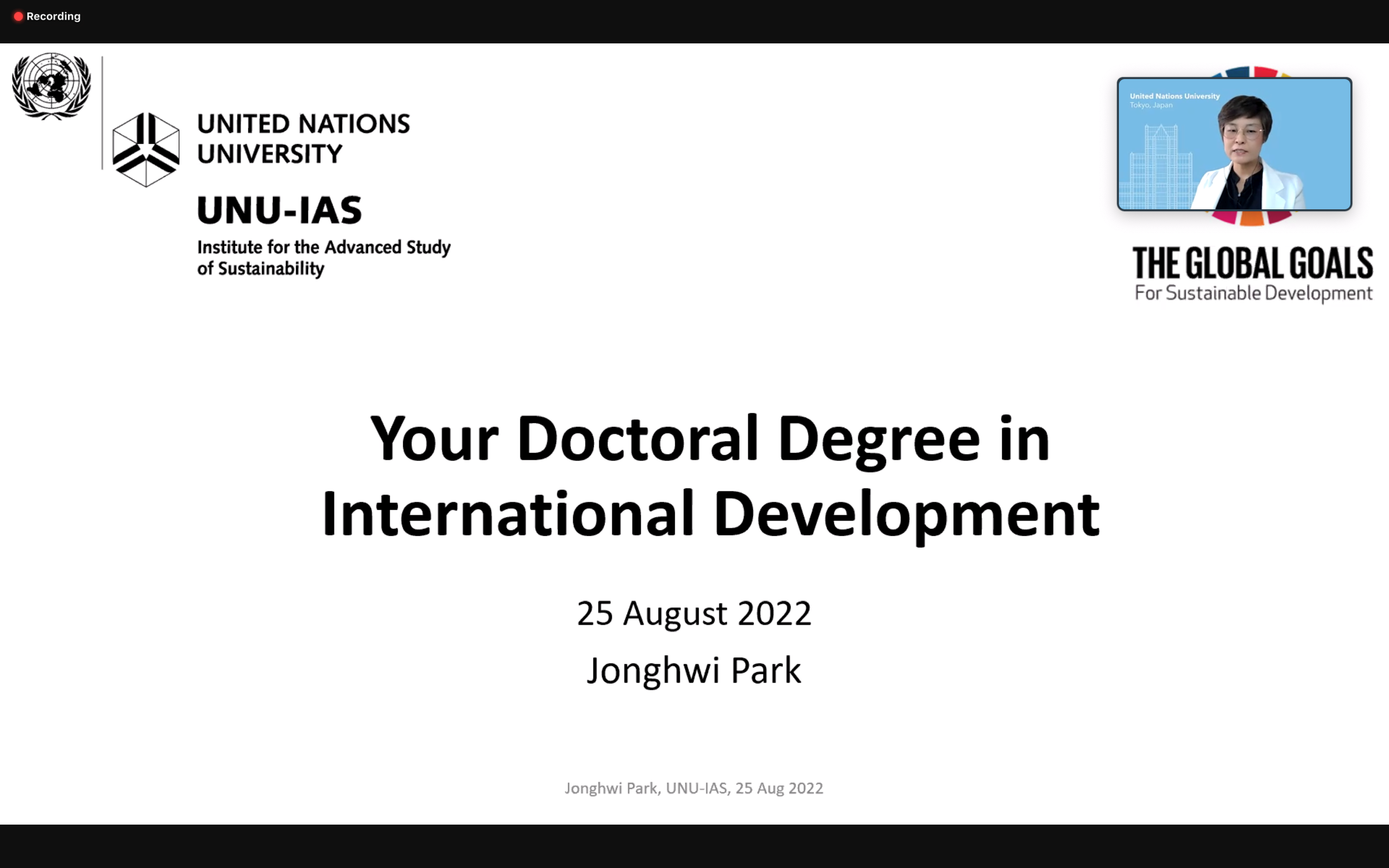
Choose an EdTech Company
Mr. Khaled Ahmed (Kyle), Event Marketing Manager and Community Manager at ClassIn and EEO, a leading edtech company based in Beijing, shared his thoughts as an educator and relationship specialist on balancing technology and education to create a perfect educational technology environment.
Kyle also shared how EEO as an edtech company, utilized technology to help educators, and described the doctoral students that edtech companies need.
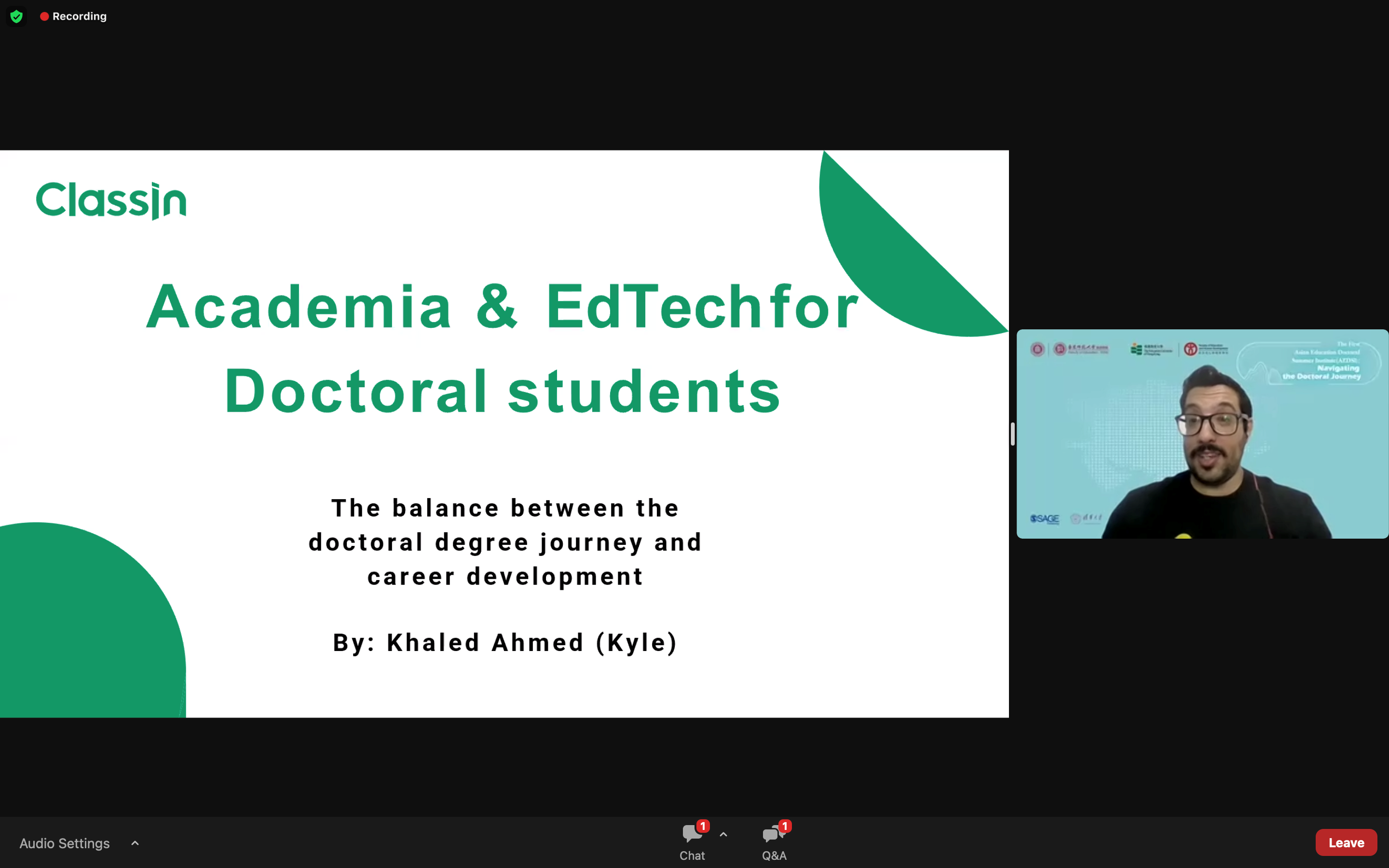
Choose an International School
Dr. Natalia Churchill from Singapore International School in HK shared her career development advice after joining an international school: a doctorate is a way to improve ability, but it also requires skills to adapt to a changing world, and face the transition of the professional cognition from Academia to real-world practice.

Make an Academic Resume
Professor Sue Saltmarsh, Associate Dean at Faculty of Education and Human Development at EdUHK, taught a wonderful and practical master class with the title of “Prepare Your Professional Portfolio”.
The emphasis here refers to a professional portfolio rather than a résumé. A résumé is not enough to cover all experiences and show all the highlights at the same time. Instead, Professor Sue Saltmarsh emphasized the need to create a special folder/portfolio to update and record one’s academic achievements and work experience in real time. As a professional facing different job or resume requirements, it is necessary to reasonably select the appropriate content from the portfolio to respond in application.
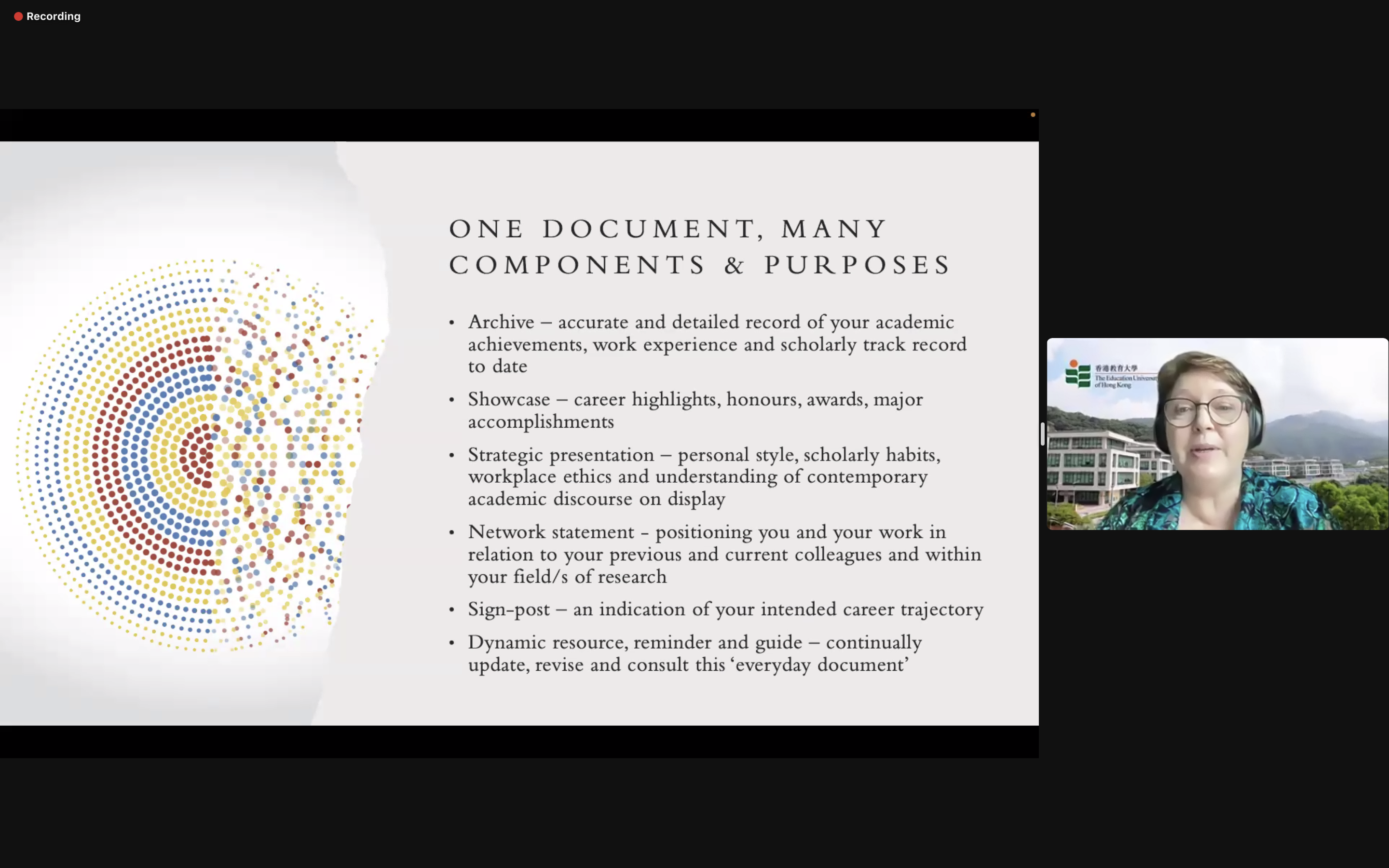
Associate Professor Alfredo Bautista, Department of Early Childhood Education at EdUHK, presented on the theme of “Build Collaborations,” who emphasized that doctoral students need to go out and establish a social network for collaboration; to learn to use academic social platforms, such as ResearchGate, LinkedIn, Twitter, Academia, and get in touch with researchers in the same field around the world. Second, one can select suitable academic conferences and maintain active participation, and establish a long-term academic social network by regularly meeting with partners in the same field.
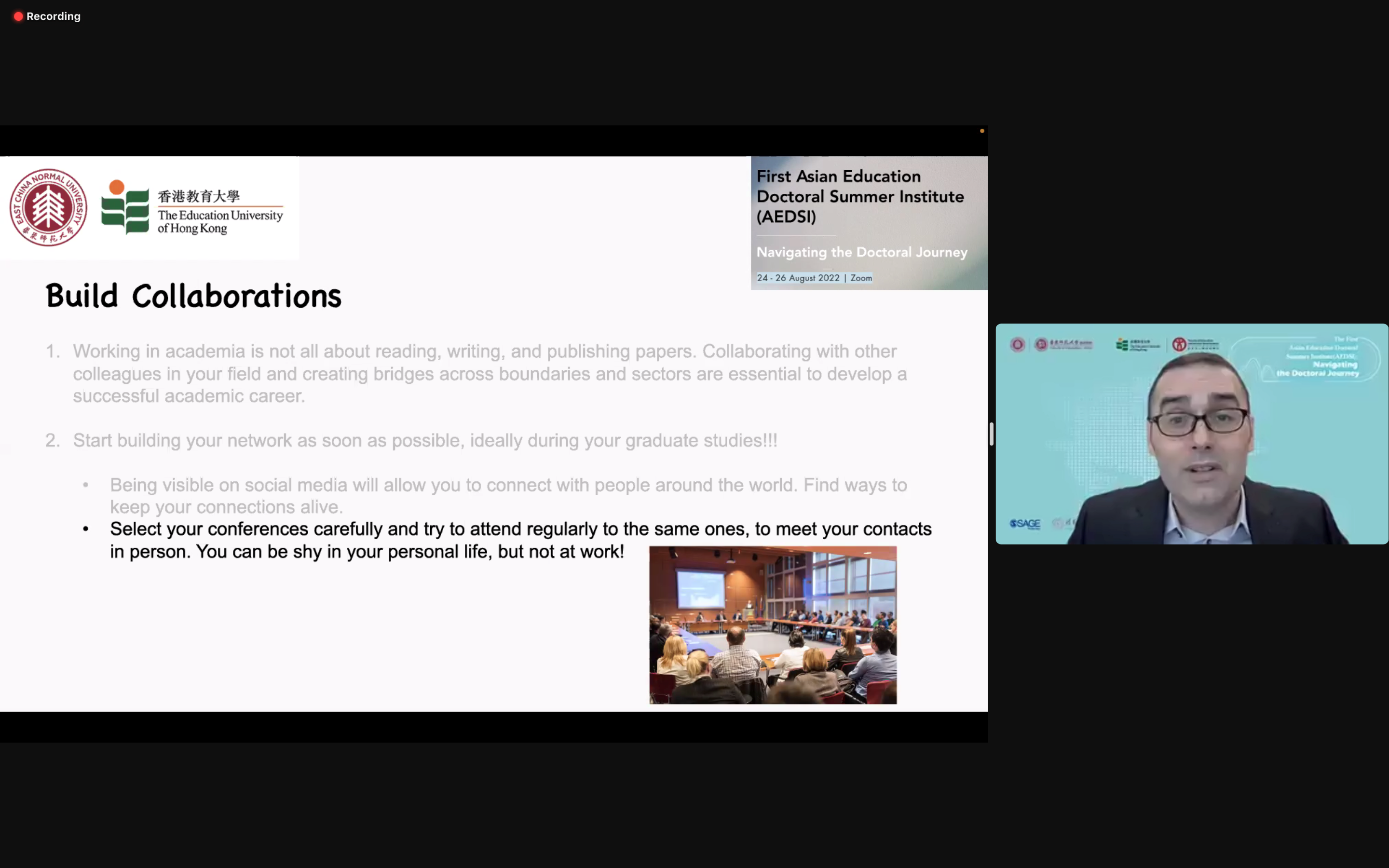
Research Methods Workshop: SAGE Session
SAGE Publishing, the support organization of the summer camp, invited Associate Professor Li Minyi from Beijing Normal University, Ms. Lan Min from Zhejiang Normal University, Mr. Gao Zhenbang and Ms. Hao Nan from SAGE Publishing Company to present on topics around learning and development. Responding to the needs of learning and developing research skills, the panelists shared their takeaways on practical questions such as “how to choose scientific research methods”, experiences of conducting high-quality research with examplary cases, as well as tools and resources to help improve information and research literacy.
Ms. Hao Nan first shared the skills of selecting and adopting scientific research methods, and introduced the research methods platform (SAGE Research Methods, SRM).
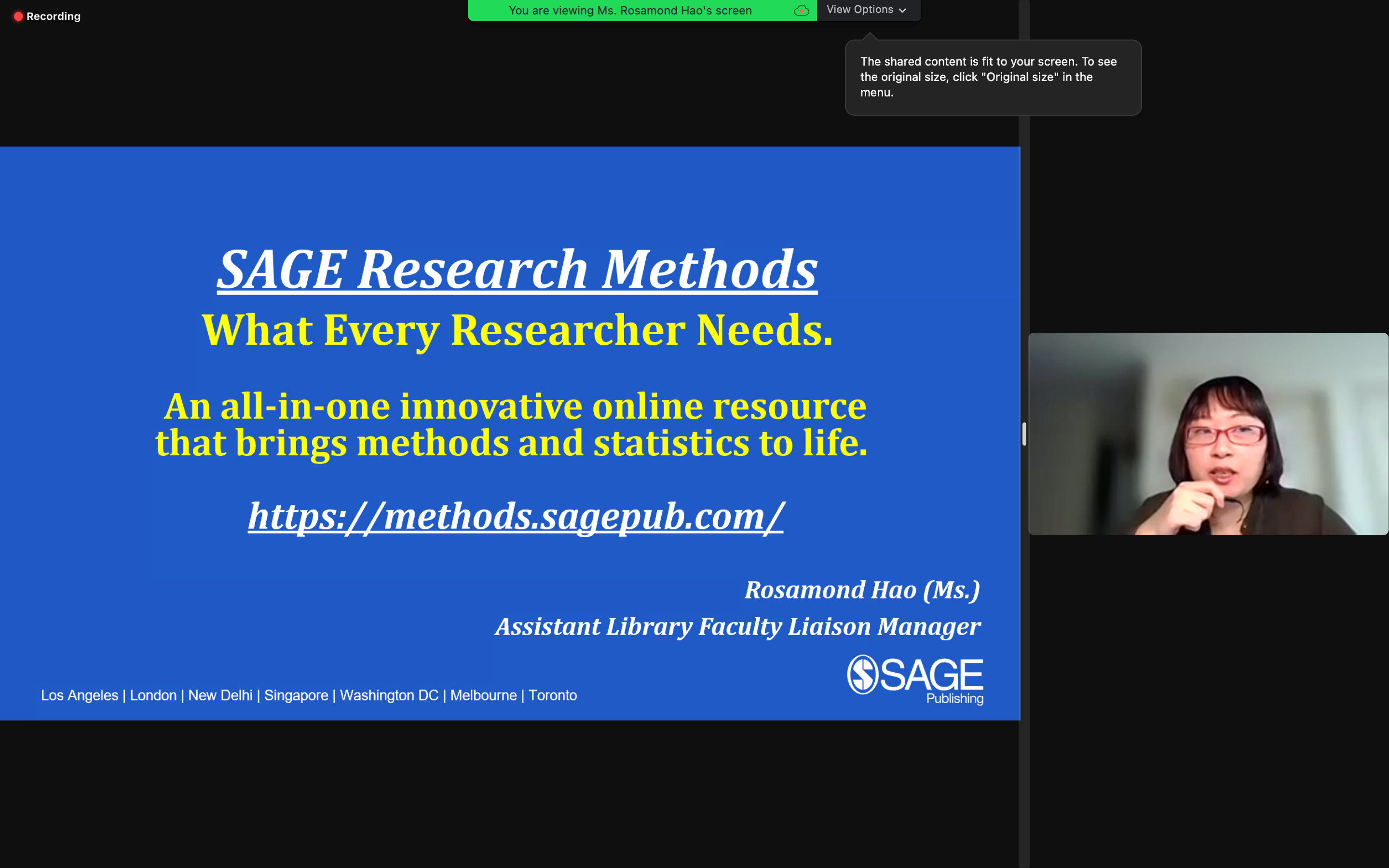
Associate Professor Li Minyi took his own international scientific research cooperation project as the starting point and shared how senior scholars use SAGE platform resources in early education research, which inspired doctoral students to seek various approaches to conduct high-quality studies.
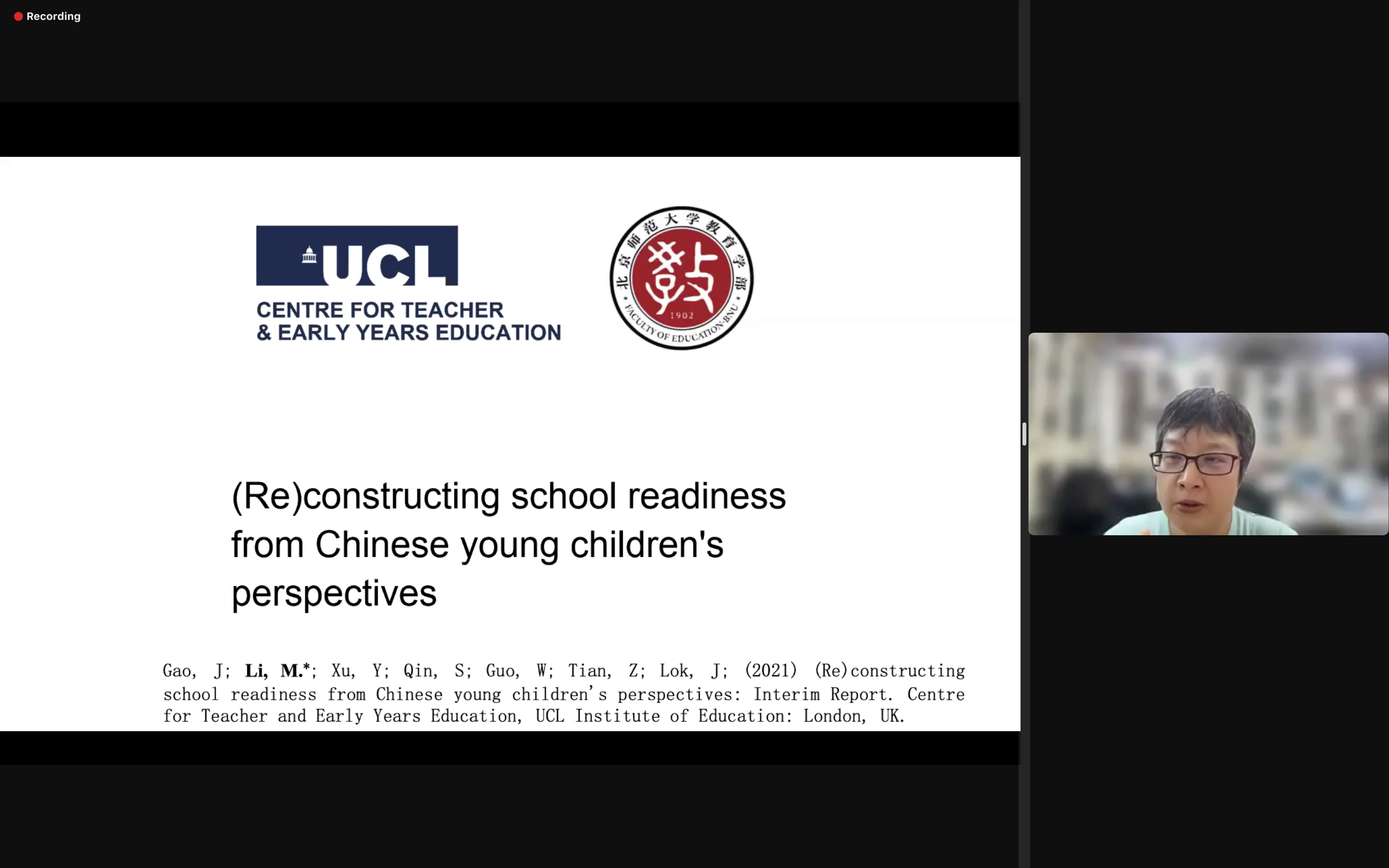
Mr. Lan Min shared his experience in using self-directed learning (SDL) research methods from the perspective of young teachers in conducting academic research.
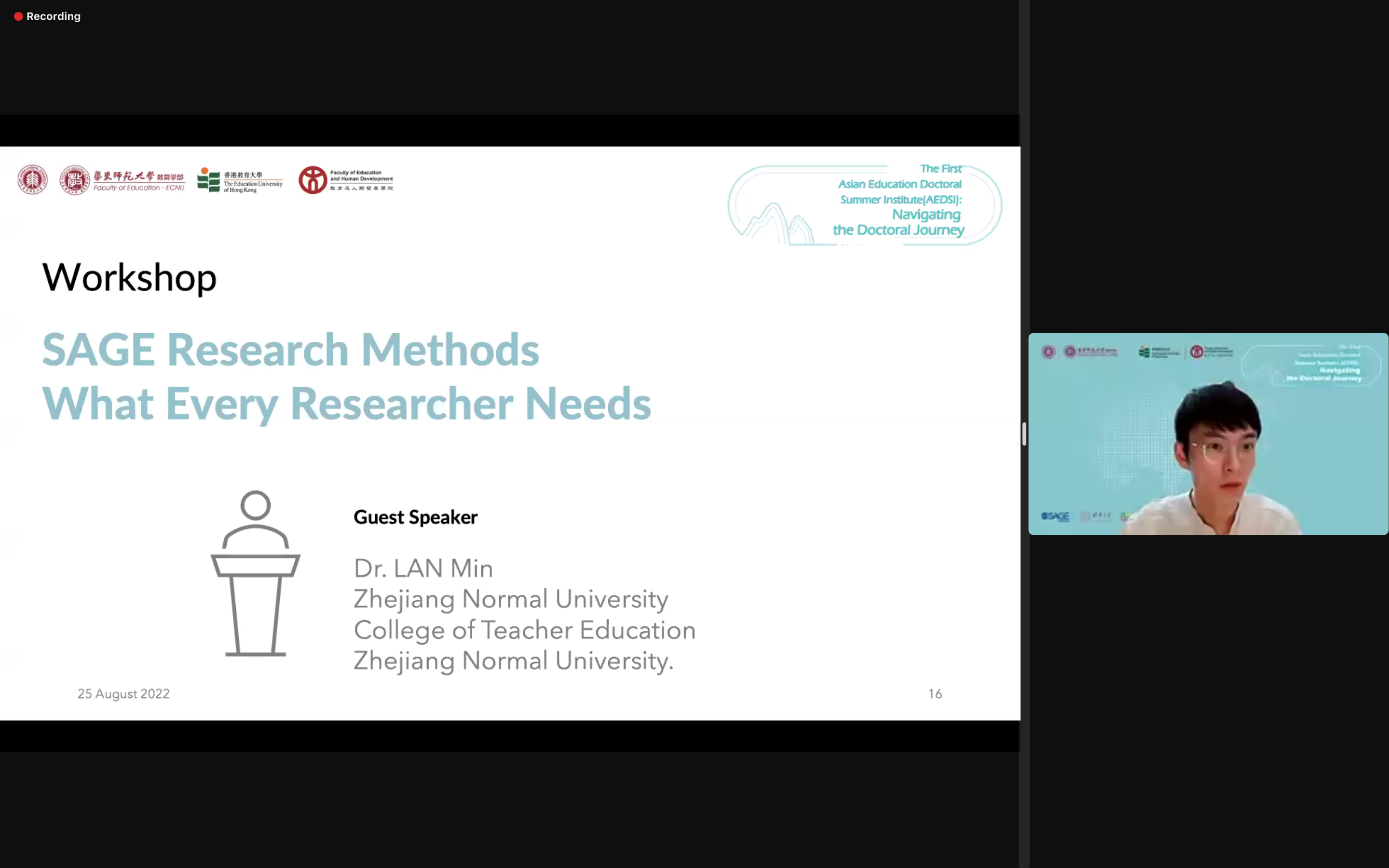
Mr. Gao Zhenbang focused on how SAGE provides digital resources to accelerate research progress and early career development. He later introduced a new online academic career competency resource called SAGE Campus.
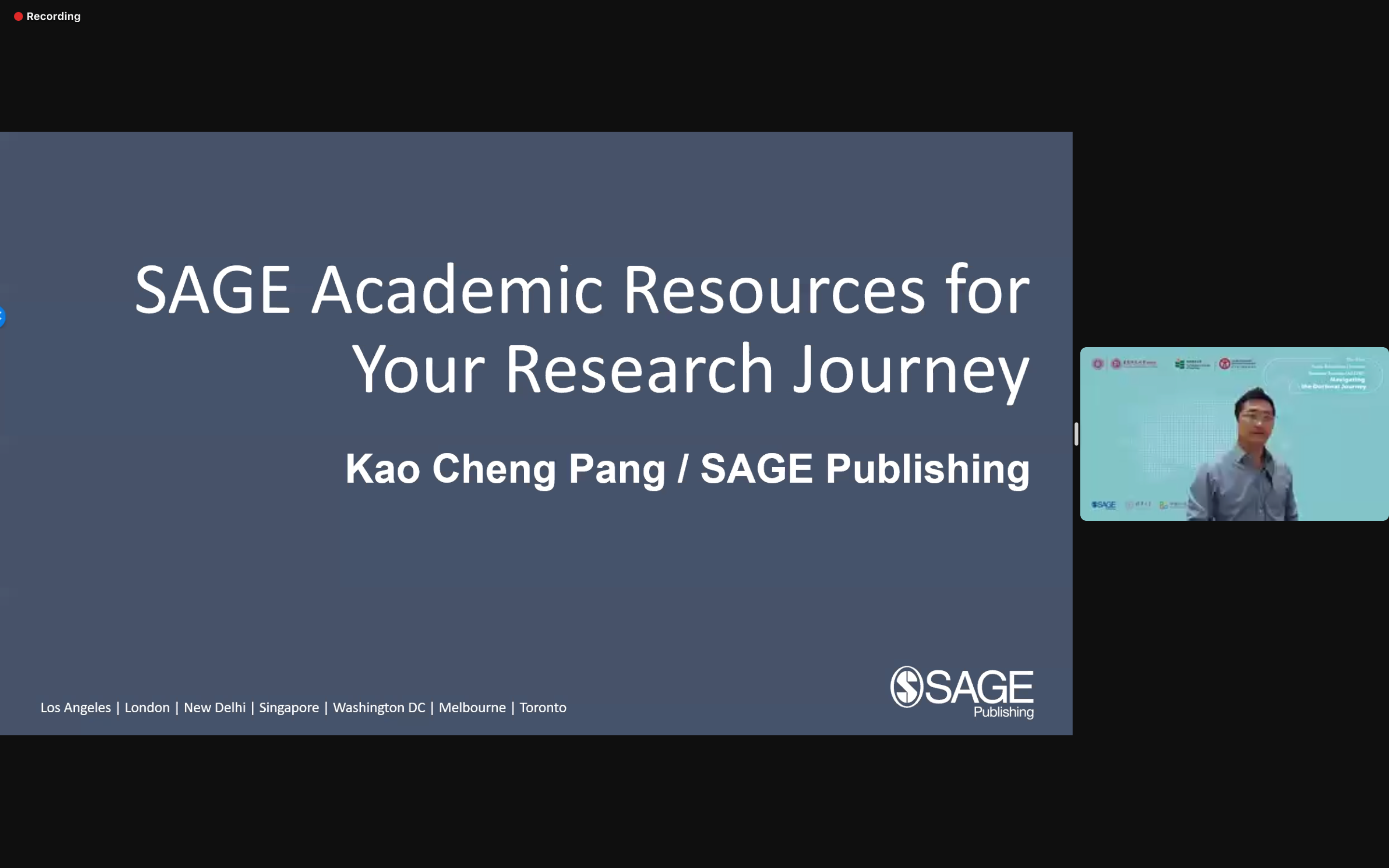
【The Ways of “Doctoral Journey ”】
For summer camp Day 3, the preparatory team specially invited three Chinese educators renowned in academic world: Professor Xie Kui from the College of Education and Human Ecology at Ohio State University, Professor Zhao Yong from the School of Education and Human Sciences at University of Kansas, and Professor Chen Xiangming from the Graduate School of Education at Peking University.
These three important guests are not only the giants in their fields, but also representatives of Asian power influencing the world. The critical growth of a doctoral career is inseparable from the study and development of educational scientific research. Therefore, three experts are invited to open up new thinking for doctoral students with respect to the perspectives of scientific research methods, interdisciplinary research and teacher development.
-Science-
Professor Xie Kui from the School of Education and Human Ecology, Ohio State University presented on the theme of “A Comparison Between Qualitative Methods and Quantitative Method.” Professor Xie Kui gave a detailed account of the definition and connotation of educational research, and clarified the types of educational research methods, as well as the characteristics, main differences and scope of application of the following three research methods: qualitative research, quantitative research, and mixed research.
He emphasized that the key to research is not which method to start with, but what to investigate. Understanding the strengths and challenges of each method helps facilitate matching research questions to appropriate methods, and therefore, there should be no bias or fixed mindset on any particular research method.
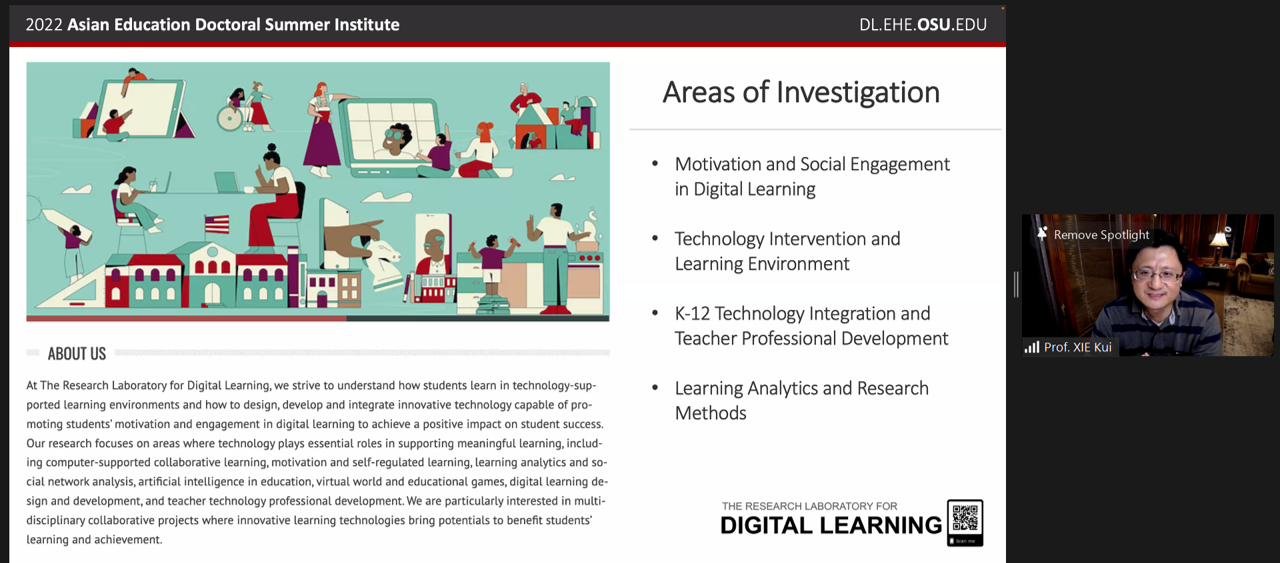
-Broadness-
Professor Zhao Yong from the School of Education and Human Sciences at the University of Kansas presented on the theme of “Interdisciplinary”. Professor Zhao pointed out that education, as a phenomenon, is interdisciplinary in nature. For doctoral students, the most important thing is to find what is the most exciting and interesting to oneself.
Professor Zhao proposed two paths on how to conduct interdisciplinary research: one is to find research methods across different academic disciplines, and the other is to find shared characteristics among research subjects. Finally, he called on doctoral students to read widely, especially the works of history, philosophy and sociology, to broaden their research horizons.
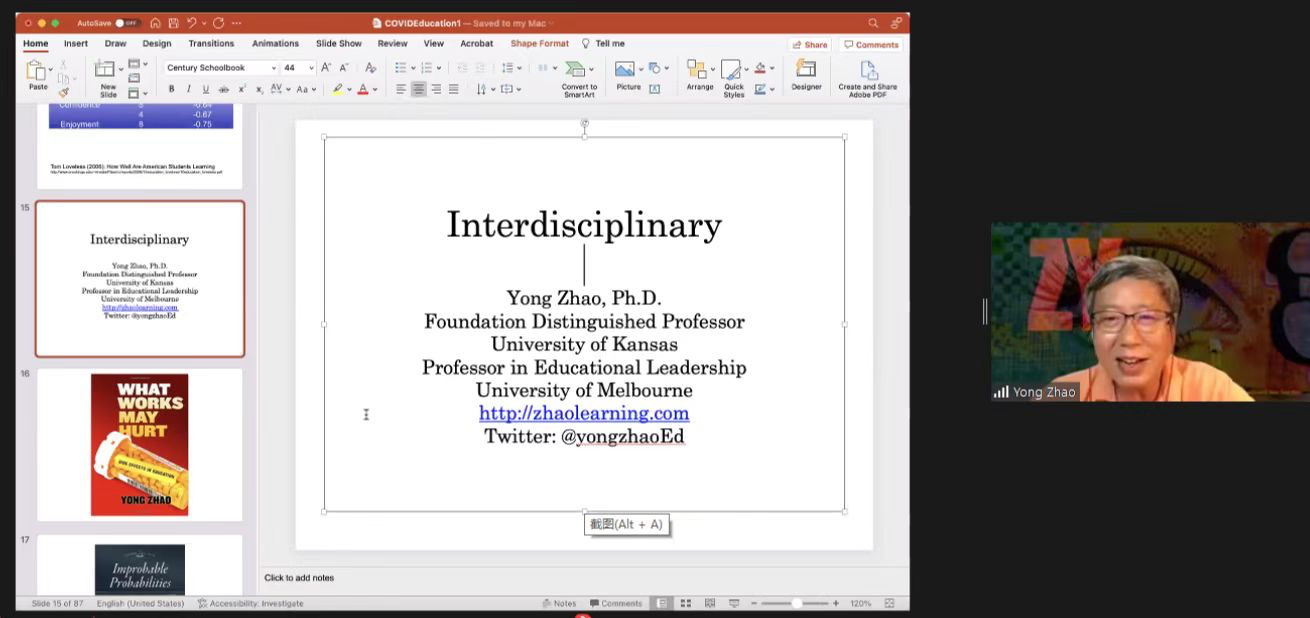
-Teaching-
The summer camp then invited Professor Chen Xiangming from Peking University Graduate School of Education to teach a master class on “Future Teacher Professional Development Trend: Being Autonomous in a Uncertain World.”
Professor Chen believes that teaching is a complex profession, so she focuses on cultivating teachers’ professional autonomy in coping with future uncertainties. Such professionalism is reflected in the mastery of practical knowledge, and the cultivation of autonomy is particularly important in professional development.
In addition, Professor Chen also emphasized that action research is an effective way to grow into a professional and self-determined teacher. During the master class, Professor Chen examined the impact of traditional Chinese thought such as “practical reasoning”, “unity of knowledge and action” and “moderation” on teachers’ participation across knowledge boundaries.
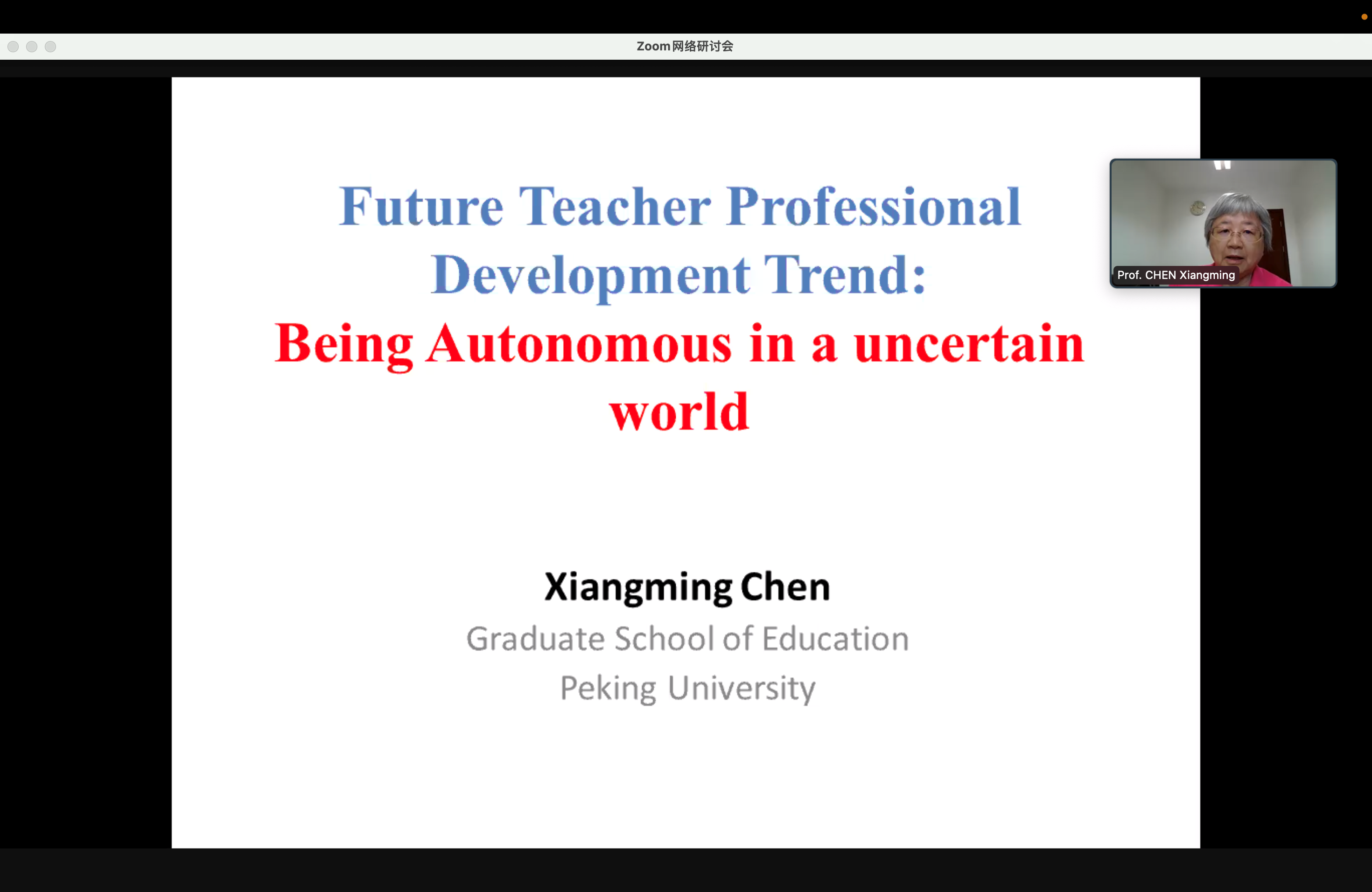
【Vibrantly Growing】
Icebreaker|Interaction|Closing
The summer camp tailored to help doctoral students start from Shanghai and Hong Kong, engage in Asia and globally, and value doctoral training. The whole training camp is planned, prepared, organized and carried out by the doctoral students from ECNU and EdUHK, who also contributed to the program design and participation by serving as event facilitators and moderators.

In order to further promote the mutual exchanges between the participants, the summer camp also held an online “ice-breaking” activities and “virtual idea exchange” meetings on the opening day and after the closing ceremony. Participants got to know each other in discussion groups and got thoughts exchanged on hot educational topics.
The three-day event were not the end for participants to learn. The communication between new friends, new partners, and future collaborators have just begun. Many participants expressed their hope to keep in touch and look forward to meeting offline in Shanghai or Hong Kong in the near future.
Source: International Affairs Division of the Faculty of Education